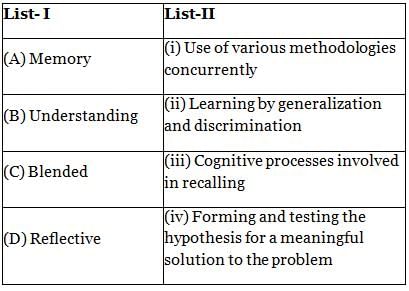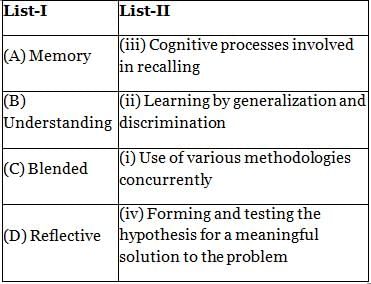Test: HP TGT Psychology Mock - 5 - Software Development MCQ
30 Questions MCQ Test - Test: HP TGT Psychology Mock - 5
At the age of 6 - 9, children start taking interest in:
In which of the following Classical Conditioning procedures Unconditioned Stimulus (UCS) is presented after the termination of the Conditioned Stimulus (CS)?
A teacher often encourages her students to describe the process which they used in solving a mathematical problem. In the context of the process of learning, this strategy:
Learners who are very sensitive to sounds and have difficulty in filtering out background noises have the disability calledLearners who are very sensitive to sounds and have difficulty in filtering out background noises have the disability called
The problem-solving strategy in which one begins from the goal and moves back sequentially to figure out a solution is called:
A student's ability to plan, monitor, evaluate and modify her own learning is known as:
To be able to create a positive learning environment within the classroom, it is important that the teachers:
Which one of the following is most appropriate regarding the tasks we design for learners to support grammar learning?
A student who considers his lack of ability as the reason for repeated failures is likely to develop a sense of ___________ .
A teacher often encourages her students to describe the process which they used in solving a mathematical problem. In context of process of learning, this strategy:
Teachers can facilitate meaningful learning by ________________.
Lev Vygotsky referred to the difference between what a child can do on his own and what can be accomplished with some assistance as:
It is often argued that rewards may not be the best method of motivating learners because:
Match the concept in Set-I with those of their corresponding explanations in Set-II and select the correct code:

Graphical tools for organizing and representing knowledge and relationships within a particular topic are known as _______.
Which among the following is not a personal factor influencing learning?
In a class having learners with diverse needs, a teacher should NOT provide options for:
Bhusan wanted to integrate the theme 'Travel' in his language class of class II. What would you suggest as the most suitable resource for his classroom transaction:




















